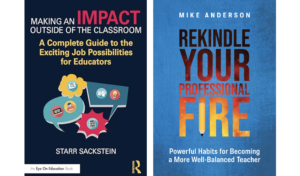Healthy Habits to Start a Career
Original Article: http://teach.com/education-technology/healthy-habits-to-start-a-career-by-mike-anderson
 The beginning of a teaching career is hectic and busy. There will be many days (and nights and weekends) when you will be overwhelmed and exhausted. Teaching is hard work, and when you’re on the steep end of the learning curve, it’s even harder. I don’t say this to scare you—quite the contrary. I think it’s important to know that things will be crazy as you begin your career in education…through no fault of your own. Everyone is overwhelmed at first.
The beginning of a teaching career is hectic and busy. There will be many days (and nights and weekends) when you will be overwhelmed and exhausted. Teaching is hard work, and when you’re on the steep end of the learning curve, it’s even harder. I don’t say this to scare you—quite the contrary. I think it’s important to know that things will be crazy as you begin your career in education…through no fault of your own. Everyone is overwhelmed at first.
That being said, it can be easy to fall into habits and patterns that make it hard to ever move out of that world of late nights, no breakfasts, full weekends, and a dwindling social circle. Too many years of this and it will be hard to maintain the passion and positive energy needed for a great career. We’ll either quit the profession or disengage emotionally, doing as little work as possible while waiting to retire.
So let’s consider some patterns we can set early in our career that will eventually nurture us and sustain us. After all, we all form habits. The key is to form the right ones. This means we need to be proactive…not just letting habits form, but crafting them intentionally. In The Well-Balanced Teacher, I offer several important categories of health and balance that teachers should consider. Here are a few ideas:
- Exercise. Daily exercise can help you recharge your batteries after a rough day. It can also give you the strength and stamina needed to be alert and positive during a long day in the classroom. Find a way to build daily exercise, even a fifteen minute walk every day after school, into your schedule. Be careful not to promise yourself to catch up on exercise on the weekends or over vacations.
- Eat good food. Get a strong breakfast with protein for good energy all day. Consider foods you can keep at school if you leave too early to eat at home (yogurt and granola cereal is one of my favorites.) Keep healthy snacks stashed in your classroom so you don’t resort to the school vending machine or the donuts (that someone keeps bringing in!) in the staff room.
- Connect with positive colleagues. Forge positive connections with colleagues. Find ones who have positive energy and who you can trust to help you sort our challenges. Create regular times to meet with these colleagues. You might get together for happy hour every Thursday evening, meet at a local diner for breakfast every Wednesday, or take them on your daily walk with you. Avoid colleagues who talk negatively about students, families, or other colleagues.
- Celebrate accomplishments. Notice them. Record them. Even seemingly little ones. Teachers who think they’re incompetent or who focus on their shortcomings don’t last long. It can be easy to let struggles and challenges dominate our thinking. An angry parent phone call can ruin an evening. The student who refuses to work has us brooding over the weekend. One way we can counter this is to train ourselves to also notice and reflect on success. Consider keeping a journal to record one positive thing that happened each day in your teaching. Or, pick one day each week to jot down successes. You’ll be more conscious of all that is going well and will have a nice pick-me-up to peruse when you’ve had a rough day.




